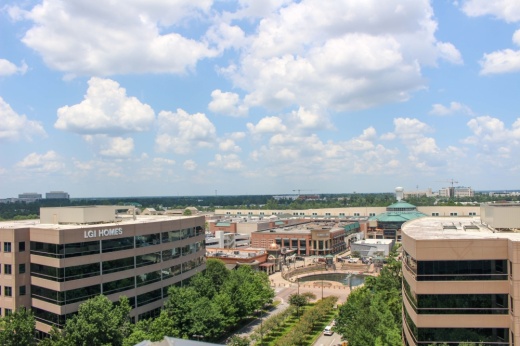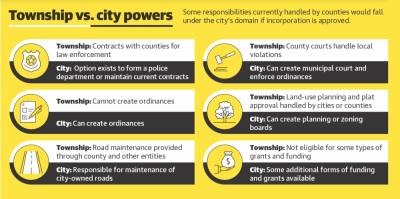Township board of directors members voted 5-2 to place incorporation on the ballot in a special meeting Aug. 13, with Ann Snyder and John Anthony Brown voting against the measure.
The township was awaiting this year’s certified tax rolls from Montgomery and Harris counties to complete the financial model. That information was presented at the Aug. 13 meeting, and an updated model included a maximum initial tax rate of $0.2231 per $100 assessment, the same as the township’s current tax rate.
In the weeks preceding the Aug. 16 deadline to place the item on the ballot, several items had remained to be completed from the township’s 2018-20 incorporation study conducted by Novak Consulting Group such as finalizing the financial model, township officials said. The board had intended to complete the model before the study was paused due to COVID-19 shutdowns in March.
Township officials have said they will act swiftly to educate the public in the two and a half months before a vote is held, including holding community engagement forums. Details on the planned forums were not established as of press time.
The Woodlands Area Chamber of Commerce also plans information sessions Aug. 23 and Sept. 15 for members.
Mike Yawn, a clinical professor with Sam Houston State University who specializes in topics including local government, said an incorporation election could be the beginning of a series of elections to decide future governance, including how a newly incorporated city would structure its government and certain services.
“It’s kind of a decision-making tree that is staggering,” Yawn said. “One decision will open up probably between three and six other major decisions depending on how things are currently structured, and that’s what I don’t know.”
Community questions
In the weeks leading up to the Aug. 16 deadline, residents and several community organizations spoke at public meetings with remarks both in favor of and opposed to a Nov. 2 incorporation election.
“Put it on the ballot; let me decide; we need to be respected as a city,” said Ana Cosio, a resident of The Woodlands.
Cosio cited local control of roads and the ability to qualify for some types of federal funding among the advantages she felt a city would bestow upon residents.
Among those who have come out against an election this year, The Woodlands Area Chamber of Commerce on July 22 presented a resolution to the board of directors, asking them to delay a vote on incorporation beyond this November. Board Chair Linda Nelson read the resolution at the meeting, citing COVID-19-related delays to the community education process, among other issues.
The Woodlands Township board of directors members have clashed with this viewpoint, stating ample information has been provided for residents to gauge the benefits or disadvantages of incorporation.
“Just because we choose not to be ready for the final exam doesn’t mean ... asking the teacher to postpone [it]. It’s going to happen whether or not we’re ready. ... You have to get informed,” Director John Anthony Brown said.
Ted Stanley, chair for Township Future, a political action committee that advocates on various issues in The Woodlands area, said in a statement the organization also questions the need for an election to incorporate at this time. He also noted the unknown effects of possible increases in COVID-19 cases.
“When you take into account the uncertainty of where the apparent new surge in [COVID-19] may lead, our need to overcome the first round of the pandemic and the lack of any pressing issue to incorporate at this time, we at Township Future feel a vote on incorporation can at least wait one year,” Stanley said.
Economic considerations
Central to the debate on the timing of an incorporation election has been the complication of COVID-19 and the effect of economic recovery on financial predictions.
However, budget projections for fiscal year 2021-22 show some growth in township revenue such as sales tax and property tax revenue.
Monique Sharp, the township’s assistant general manager for finance and administration, said Aug. 13 the updated financial assumptions for incorporation now show 2.75%-3% growth in sales tax revenue in the next five years instead of the 1% previously assumed. Property tax revenue is also expected to be greater than projected, she said Aug. 13.
Before the updated financial projections were available, the provisional maximum tax rate for an incorporated city was determined to be $0.2862 per $100 assessed value, $0.0622 more than the township’s current tax rate.
Township Chair Gordy Bunch has stated another source of revenue for a city could be grants and funding that are only available to incorporated municipalities, such as the federal COVID-19 relief distributed in 2020 and 2021.
A city would also have more responsibilities, which could affect the community’s law enforcement.
During incorporation planning meetings, The Woodlands officials opted to include a hybrid model for law enforcement in its financial assumptions. This would create a city police department and eventually transition from its current model of services contracted with the Montgomery and Harris county sheriff’s offices.
It would also be able to create a city municipal court and take over some services currently provided by the county, such as road maintenance. Officials have said becoming a city would also open up more avenues for funding, and it would have the power to enact ordinances.
Gaining recognition as a city at the state and federal levels has spurred other communities in Southeast Texas, such as Plantersville in Grimes County, 29 miles northwest of The Woodlands—to pursue incorporation. It incorporated in 2017 with a population of about 500, Mayor Karen Hale said.
“We wanted to be ‘at the table’ for decisions involving our area,” Hale said. “An unincorporated [community] has no input with the county, the state, [Texas Department of Transportation] and others on decisions which impact our community.”
Becoming a city
The township has had the option to incorporate since 2014 under regional participation agreements with Houston and Conroe, and its immunity from annexation from those cities will expire in 2057. Annexation has since been the subject of speculation from both residents and officials.
At a July 28 meeting, resident Steve Leakey noted legislation was passed in 2017 and 2019 requiring residents’ approval for the annexation of an unincorporated area. Leakey is also president of the regional Voter Awareness Council, a Montgomery County nonprofit voter education organization.
Bunch said the township received an opinion from attorney Monte Akers stating those laws are still untested; however, Bunch said annexation concerns did not spur the incorporation study.
With a population of 117,270 as of the 2019 U.S. Census Bureau 1-Year American Community Survey, The Woodlands would be unusually large for a newly incorporated city if residents approve a measure, Yawn said.
“If they incorporate, they would immediately become the largest general-law city in the state,” Yawn said.
Upon incorporation, a city of any size first becomes a general-law city, which normally have no more than 5,000 residents. New city council members would then be elected by residents, and it could subsequently become a home-rule city with its own charter and constitution.
Board Vice Chair Bruce Rieser said a shift to a city government would not be immediate.
“This whole process will take another five years if and when the public decides that we’ve grown up enough to be a city,” Rieser said. “It will be another five years before we are able to implement the entire array of municipal services that a city should provide.”
The incorporation study includes cost projections for the first five years following an election.
Yawn said voter education will be crucial if an election is placed on the ballot.
“I would think that [residents of] The Woodlands are more informed than your average citizen, but this is a lot to be informed about,” he said.








